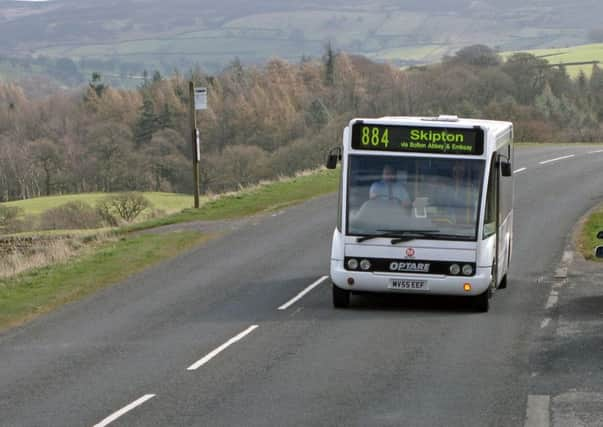Martin Abrams: Threat to buses is a danger to communities and economy


This could cut off communities and make large parts of the county no-go areas if you do not have a car. Local and national government need to work together to stop the cuts and make sure buses retain their essential role at the centre of the transport network.
The decline in Yorkshire’s buses is not unique to the county. In the last four years, bus use has fallen by six per cent in England.
Advertisement
Hide AdAdvertisement
Hide AdExcluding London, passenger numbers fell by 2.5 per cent last year alone.
Worst hit are the quarter of all bus services which rely on local authority support. These have seen cuts of 12 per cent in the last two years alone.
In the Yorkshire and the Humber region, local authorities have cut £4.5m in support for buses since 2011.
This year, all four transport authorities in the county have cut funding.
Advertisement
Hide AdAdvertisement
Hide AdOver the next few years local authorities across England will face some financially agonising decisions and there is the very real risk of even worse cuts to bus services.
It is not difficult to see why cuts have been made. The Local Government Association estimates that by the end of this Parliament, local government funding will have been cut by £20bn in just five years – a fall of 43 per cent.
Local authority supported buses run where commercially operated services would not. They range from just five per cent of services in some urban areas to almost 100 per cent in some rural ones.
They are most used by vulnerable and low income groups, generally young people who have been hardest hit by the recession and pensioners entitled to free bus travel.
Advertisement
Hide AdAdvertisement
Hide AdThey serve communities where no alternative bus route exists, meaning that any cut or alteration can have a huge impact on residents and local economies. They also provide services in evenings and at weekends when otherwise services would cease.
Cutting buses is counter-productive and short-sighted. In Yorkshire, over 140,000 young people are currently not in education, work or training.
With the percentage of under-20s with a driving licence dropping steadily, this group increasingly relies on the bus to give them access to employment and education opportunities.
Cuts in bus services coupled with the location of jobs in places not served by public transport, the lack of evening bus services and rising bus fares make travelling to local jobs impossible for many young people.
Advertisement
Hide AdAdvertisement
Hide AdFor older people, buses are often a vital lifeline. Loss of mobility is a contributor to the social isolation and loneliness that older people can face.
Most importantly, this has a detrimental effect on health and well-being and has knock-on financial implications for health and social care services.
Buses are a key driver for regional economies, more people commute to work by bus than all other modes of public transport combined and to continue to cut buses may prove to be a false economy costing much more in the long term than any short-term savings.
Local opposition to the cuts is building. For example, an online petition has been set up to protect routes like the 31X between Easingwold and Helmsley, important for access to work, school and vital facilities including health services.
This is likely to be just the tip of the iceberg.
Advertisement
Hide AdAdvertisement
Hide AdNext year further deep cuts to local authority budgets will kick in meaning further pressure on bus budgets.
North Yorkshire County Council has been consulting on cutting £1.1m from its supported bus service budget per year.
This would be around 20 per cent of their supported budget. Worcestershire’s plan to cut all support for buses (currently around £3m a year) is a more severe example of what could be about to come.
There are things which we should be doing to protect our buses. As well as recognising the money spent on supporting buses as excellent value, we need central and local government to work together on minimum access standards for hospitals, colleges and other vital services.
Advertisement
Hide AdAdvertisement
Hide AdWe should plan investment over the long term like we do with trains and main roads. This would give certainty not just for local authority planners, but communities and employers, too.
We should invest to help those who rely on buses by fully-funding concessionary fares for both young people and older bus pass holders. We should also look at new initiatives like a tax rebate on season tickets for those in apprenticeships.
Lastly, we need central Government to understand the importance of buses.
Rather than leaving it to the Department for Communities and Local Government to support services, we should recognise how important buses are to objectives of many other departments – Work and Pensions, Education and Health, for example, all need decent bus services.
Advertisement
Hide AdAdvertisement
Hide AdInvestment from these sources would highlight the role buses have in gluing our transport network together and break the cycle of decline which threatens to leave large areas of the country as public transport deserts.
Martin Abrams is the Campaign for Better Transport’s public transport campaigner.